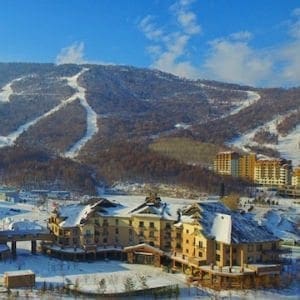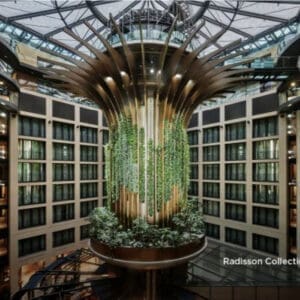 New York City has been working through an enormous hotel construction pipeline for the past several years Ñ the largest in the nation Ñ and one that is expected to keep a lid on rates and room revenue until sometime next year.Ê
New York City has been working through an enormous hotel construction pipeline for the past several years Ñ the largest in the nation Ñ and one that is expected to keep a lid on rates and room revenue until sometime next year.Ê
With so many new properties coming online this year, average rates are expected to fluctuate but essentially remain unchanged from last year, says Sean Hennessey, Clinical Assistant Professor at the Jonathan M. Tisch Center for Hospital and Tourism at New York University and CEO of Lodging Advisors. The strong underlying demand Ñ occupancy has exceeded 80 per cent Ñ should result in average rate gains of 3 per cent to 5 per cent next year and beyond. ÒThe city may be over-invested, but it’s hard to say it’s oversupplied,Ó he says.
Some headwinds, of course, could prolong the recovery. The Trump travel restrictions and strong dollar could discourage foreign tourists this year. New York’s tourism marketing agency, NYC and Company, expects the number of international visitors to fall by 300,000 to 12.4 million as a result of the constraints imposed on six Muslim nations and the accompanying bad publicity. That would be the first decline since 2010. Although the number of domestic visitors is expected to rise, that won’t offset the loss of foreign spending, since overseas visitors spend about US$2,000 in the city, compared with US$500 for US tourists.
Michelle Russo, President of asset management firm hotelAVE, says New York hotels are feeling the sting. ÒYear to date, our New York hotels are seeing declines from Singapore, Hong Kong, Germany, Japan and the United Kingdom,Ó she says. Through May, she anticipates declines from France, Spain and Switzerland. As a result, she expects a rate recovery won’t begin until 2019 or 2020.
In addition, the estimated 40,000 rooms offered by Airbnb and other sharing sites has made it difficult for established hotels to raise rates, says Vijay Dandapani, CEO of the Hotel Association of New York City and former President of Apple Core Hotels, who agrees that rates may not improve until 2019. Even at peak demand times such as Pope Francis’ visit in September and events tied to the presidential inauguration, anticipated rate increases failed to materialize, Mr Dandapani says.
The supply overhang contributed to declines in average rates and RevPAR last year and in 2015. Hersha Hospitality Trust forecasts that the average rate in Manhattan will fall by 0.7 per cent this year to US$276.54 but then rise nominally to US$280.41 in 2018, a 1.4 per cent increase.
RevPAR is expected to fall by 0.8 per cent this year to US$239.62 but then increase the following year by 1.5 per cent to US$243.18. However, that’s still some US$17 below the pre-recession peak, and it’s not expected to return to that level until 2020, according to Hersha.
Analysts say projects added more recently to the pipeline could be canceled or converted to condos. With land prices rising, developers will turn to more lucrative office and residential projects, says Jeff Davis, a New York-based international director at real estate brokerage JLL. ÒThe highest and best use won’t be hotels,Ó he says.
Demand improving
Hotel managers say underlying demand is strong. November and December were the best months in several years, with RevPAR growth of 7.3 per cent and 5.5 per cent growth respectively, says Peter Majeski, Manager, Investor Relations and Finance at Hersha. Average daily rate grew 7 per cent in November and 4 per cent in December, he adds.
ÒTravelers who want to visit New York will come,Ó says Kathrin Apitz, General Manager of the Firmdale’s newly opened boutique, the Whitby Hotel in Midtown, where the entry-level room is US$695.
Morris Moinian, President of Fortuna Realty Group, which recently opened the first of two boutique hotels in Chelsea, says recent negativity Òsupersedes reality.Ó However, he is encouraged by a crackdown on illegal listings on home-sharing sites. Since 2010 it’s been illegal to rent space in New York City for less than 30 days without the owner present, but hosts often ignored the restrictions. The law passed by the state last fall makes it illegal to advertise sublets, which removed an obstacle to enforcement.Ê However, he worries that this shadow supply will keep pressure on rates. Another ongoing concern: third-party websites that compare rates and Òpush the floor lower,Ó in spite of strong fundamentals.
JLL’s Davis points out that with most of the new supply to be delivered this year and early next year, metrics should start improving later in 2018. Hennessey notes that the city is enjoying a spurt of commercial development, especially along the West Side, which can only boost demand: ÒThere’s a lot of economic momentum.Ó
By Judith Crown from Hotels Magazine















